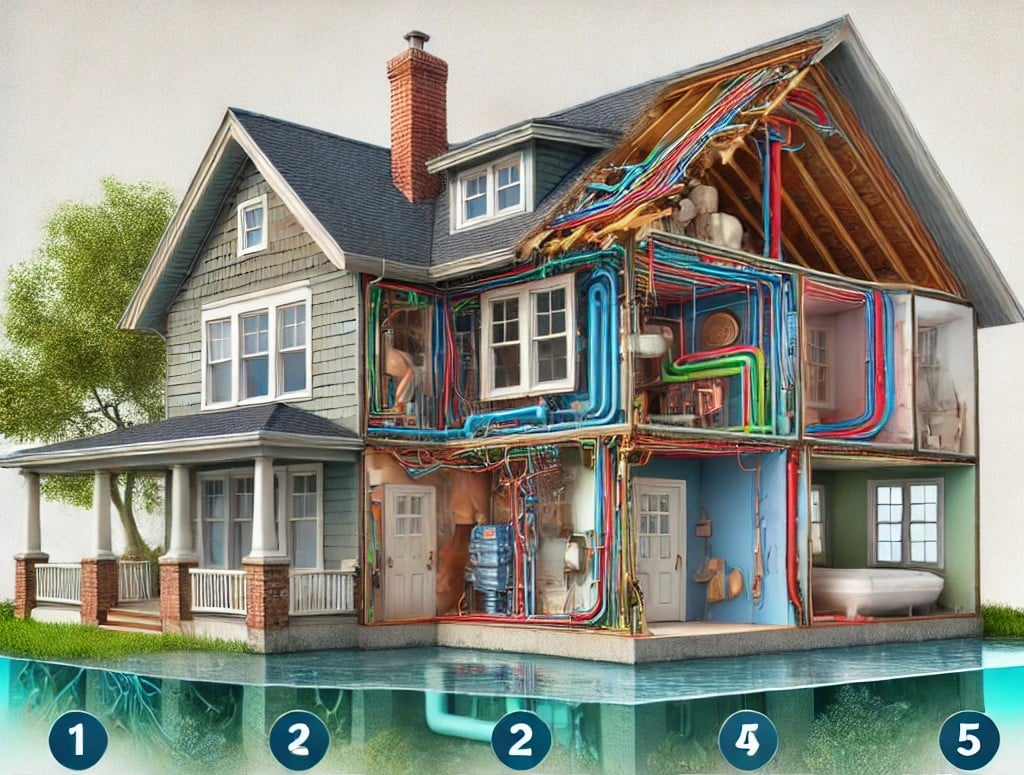Phone:
(727)358-0489
Physical address:
13604 101st Terrace
Seminole, FL 33776

Buying a home is one of the biggest investments most of us will ever make. Whether you’re a first-time buyer or a seasoned homeowner, ensuring that your new property is in good condition is crucial. This is where a home inspection comes in. A home inspection provides an in-depth look at the property’s condition, uncovering potential problems that may not be immediately visible. But what exactly does a home inspector look for? In this blog post, we’ll explore the five most important things that are inspected during a home inspection and why they matter to your investment.
Why It’s Important: The roof is one of the most critical parts of any home, serving as the first line of defense against the elements. A damaged or deteriorating roof can lead to a host of problems, including leaks, mold, and structural damage, all of which can be costly to repair.
What Inspectors Look For: During a home inspection, the inspector will carefully examine the roof’s condition, looking for signs of wear and tear, such as missing or damaged shingles, sagging areas, and leaks. They’ll also check the gutters and downspouts to ensure they’re properly attached and functioning as they should.
Key Issues:
Why It’s Important: A home’s electrical system is essential for safety and functionality. Faulty wiring can be a fire hazard, while an inadequate system can’t support the demands of modern appliances and electronics, leading to frequent tripping breakers or potential electrical failures.
What Inspectors Look For: The home inspector will evaluate the electrical panel, wiring, outlets, and fixtures. They’ll look for outdated or dangerous wiring, such as knob-and-tube or aluminum wiring, which is more prone to overheating and causing fires. The inspector will also check that the electrical system is up to code and can handle the home’s electrical load.
Key Issues:
Why It’s Important: A home’s plumbing system is vital for the delivery of clean water and the removal of waste. Issues with plumbing can lead to water damage, mold growth, and costly repairs.
What Inspectors Look For: Inspectors will examine the home’s plumbing, including pipes, faucets, toilets, showers, and the water heater. They’ll check for leaks, corrosion, water pressure, and the type of pipes used. Inspectors will also look at the water heater to ensure it’s in good working condition and doesn’t pose a safety risk.
Key Issues:
Why It’s Important: The foundation is the structural backbone of your home. Issues with the foundation can lead to severe problems, including uneven floors, cracked walls, and doors or windows that don’t close properly.
What Inspectors Look For: The home inspector will assess the foundation for any signs of cracking, settling, or movement. They’ll also check the crawl space or basement (if applicable) for moisture, mold, and any signs of water intrusion.
Key Issues:
Why It’s Important: The heating, ventilation, and air conditioning (HVAC) system is crucial for maintaining a comfortable indoor environment. An outdated or poorly maintained HVAC system can lead to high energy bills, inadequate heating or cooling, and even pose health risks if not properly ventilated.
What Inspectors Look For: Inspectors will evaluate the age, condition, and functionality of the HVAC system, including the furnace, air conditioning unit, and ductwork. They’ll also check the thermostat and look for any signs of improper installation or maintenance.
Key Issues:
Each of these five areas—the roof, electrical system, plumbing, foundation, and HVAC system—plays a critical role in the overall safety, functionality, and longevity of your home. By focusing on these key areas, a home inspection can help you avoid costly repairs, ensure your home is safe and comfortable, and give you peace of mind knowing that your investment is protected.
As a homeowner or buyer, there are steps you can take to prepare for the home inspection process and ensure everything goes smoothly:
In summary, a home inspection is an essential step in the home buying process, providing valuable insights into the condition of the property. By focusing on the roof, electrical system, plumbing, foundation, and HVAC system, the inspection can help you identify potential problems before they become costly repairs. Whether you’re buying a new home or maintaining your current one, a thorough home inspection can protect your investment, ensure your home is safe, and give you the confidence that your new home is everything you hoped it would be.